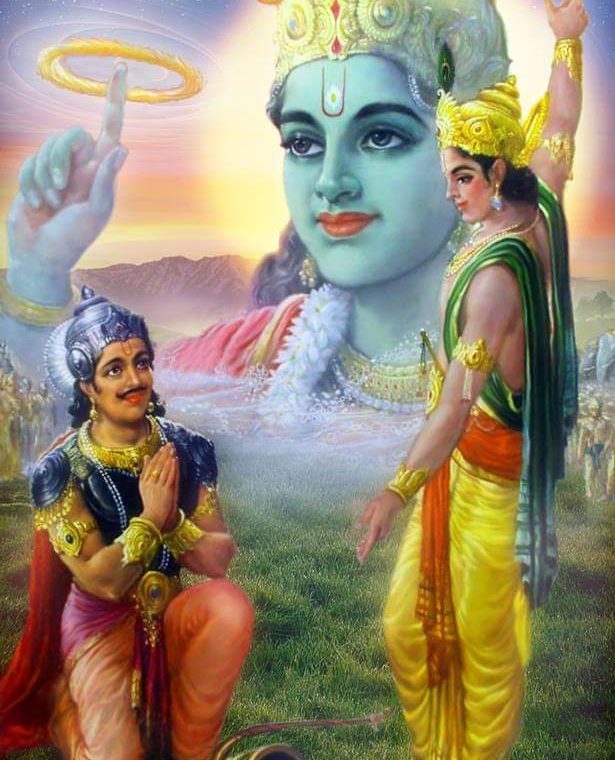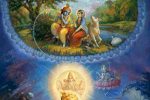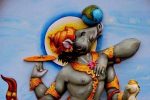Name 100
100. Acyutaḥ अच्युतः
Nāma 318 is also Acyutaḥ.
Acyuta means imperishable. It also means that He upholds dharma.
Mahānārāyaṇa Upaniṣad (XIII.i.3) says, “śāśvatam śivam acyutam” which means permanent, auspicious and unchanging. Brahman has all these supreme qualities.
Achyutah – One who never Slips
Achyutah can be interpreted in 3 ways:
He does not slip from his established post. Sri Adi Sankara says ‘Svaroopa saamarthyaat na chyuto na chyavate na chyavishyate iti Achyutah’ – He has never slipped, He does not slip and He will not slip from his true post.
He does not allow his devotees to slip i.e., He never lets them down in their hour of need. He is ever present in the heart of His devotees.
One who undergoes no modifications such as birth, growth, decay, disease, etc.
Sri Parasara Bhattar explains that He does not slip at all from His position of Lordship ever, unlike Brahma or Indra who are subject to loss of position from time to time, hence He is called Achyuta.
“yasmaat na cyuta purvo’ham acyutastena karmanaa” – MahaBharata Santi Parva 12.330.16.
Sri Bhattar’s interpretation of the above Shruti leads to the second meaning which is: “I have never abandoned (my Bhaktas), because of this act of mine, I am known as Achyuta.” His words are “tebyah prapannebhyah na apagatah Achyutah – He is never away from those who have sought refuge in Him.”
na cyaavayati iti Achyutah – One who does not let His devotees slip – Arjuna calls Krishna as Achyuta, who has taken upon Himself to be his charioteer and He will never let him slip.
Narayana Upanishad says “Patim Vishvasyaatmesvaram Shaasvatam Shivam Achyutam – He is the Lord of the Universe, Lord of the Beings, Eternal, Auspicious and free from slippage or change.”
Cyti means “fall” and Cyuta means “fallen”. Acyuta means “One who has never fallen from His true nature”. Several explanations are given to further expand this Guna of the Lord. The upanishad says of Bhagavan – “Sasvatam Sivam Acyutam” – Eternal, Auspicious, and Changeless” Bhagavan is Acyuta because he does not slip from stage to stage in the sequence of events such as birth, living, growth, change in appearance, decay, and finally disappearance from the body.
It may be noted that this Nama occurs three times in the Vishnu Sahasranamam.
१००. ॐ अच्युताय नमः |
100. OM Acyutāya Namaḥ
Achyutah -Chyutah= Fallen; Achy utah: One who has never fallen: the Ever-Pure Reality which is never fallen into the misconceptions of Samsar: the Pure Knowledge in which ignorance has never come to pollute Its purity. Lord Himself says in Bhagavata, “I have never ever before fallen from my Real Nature; therefore, I am Achyutah”.
Hari svarūpasāmarthyāt na cyuto cyavate na ca,
Cyaviṣyata iti viṣṇuracyutaḥ kīrtyate budhaiḥ.
हरि स्वरूपसामर्थ्यात् न च्युतो च्यवते न च ।
च्यविष्यत इति विष्णुरच्युतः कीर्त्यते बुधैः ॥
By reason of His inherent power, He is not one who fell, He does not fall and will not fall in the future. So He is Acyutaḥ.
So also did Bhagavān say in Śānti parva of Mahābhārata: ‘Yasmānnacyuta pūrvo’hamacyutastena karmaṇā’ (The cessation of a separate conscious existence by identification with Supreme Brahman is the highest attribute or condition for a living agent to attain.) And since I have never swerved from that attribute or condition, I am, therefore, called by the name of Achyuta.
INTERPRETATION GUIDED BY SANT VANI (WORDS OF SANITS)
Acyutaḥ (also name 318)
The one who never moves away.
Already, the Lord has been said as Aja and now He is said to be Acyuta. Heat and brilliance are the svarūpa, the nature of fire. Can fire move away from heat and brilliance? If it could, fire would stop being fire. Heat is its nature, intrinsic to fire. If it can move away, then it cannot be called its svarūpa, nature.
The Lord is of the nature of sat-cit-ānanda. He is the creator, sustainer and also the one who dissolves the entire jagat unto Himself and that is His sāmarthya. From these the Lord na cyutaḥ– has never deviated, na cyavate–does not deviate, na cyaviṣyate–will never deviate. Because He has no cyuti, fall or decline at any time. He is known as Acyuta. There is no fall from grace, no fall from position, no fall from any path, no fall from the higher to the lower, no fall at all.
He who never “falls” from his position and never will fall. He who is never perturbed, shaken or disturbed and is forever in the exalted state of pure consciousness and is eternal, calm, and unwavering(Śaṅkara). One who has never slipped and also never lets his devotees slip. He who is always there for his devotees and never lets them slip(Parāsara Battar).
‘Cyuta‘ means “fallen” i.e. someone who wavers or is not steady. “Acyuta” is he who never falls or deviates from his true nature – he who is not led astray by emotions, fear, despair, laziness, grief, and so on. This is why Viṣṇu and more specifically his Pūrṇāvatāra Kṛṣṇa is referred to as Acyuta because nowhere in the Mahabharata or during the brutal war does he ever waver from the path that he has decided to take – the establishment of Dharma and the destruction of Adharma.
In the Bhagavad-gītā, Arjuna refers to Kṛṣṇa as Acyuta three times and it is interesting to examine each in context:
Chapter-11; verse-41: Arjuna realizes who his charioteer actually is (he has seen the Viśvarūpa that has boggled his senses and he tells him:
“Taking you for an ordinary friend, I presumptuously addressed you as, “O Krishna,” “O Yadava,” “O my dear mate.” I was ignorant of your majesty, and magnificence and your true nature. And I have sometimes treated you with disrespect, while playing, resting, sitting, eating, when alone, or before others—for all that I beg forgiveness.”
सखेति मत्वा प्रसभं यदुक्तं
हे कृष्ण हे यादव हे सखेति |
अजानता महिमानं तवेदं
मया प्रमादात्प्रणयेन वापि || 11-41||
यच्चावहासार्थमसत्कृतोऽसि
विहारशय्यासनभोजनेषु |
एकोऽथवाप्यच्युत तत्समक्षं
तत्क्षामये त्वामहमप्रमेयम् || 11-42||
sakheti matvā prasabhaṁ yad uktaṁ
he kṛiṣhṇa he yādava he sakheti
ajānatā mahimānaṁ tavedaṁ
mayā pramādāt praṇayena vāpi
yach chāvahāsārtham asat-kṛito ’si
vihāra-śhayyāsana-bhojaneṣhu
eko ’tha vāpy achyuta tat-samakṣhaṁ
tat kṣhāmaye tvām aham aprameyam
This is a grand moment of reckoning for the peerless warrior who has realized that his humble charioteer is the actually the eternal charioteer of his life.
It stands to reason then that when Arjuna calls Kṛṣṇa as Acyuta in Chapter-01; verse-21 that he still had no inkling of the greatness of that personality. However, it is placed here because this is a pivotal moment in the Bhagavad-gītā, for now the warrior is going to melt into compassion and pity unbecoming of his kṣatriya nature and it would require that Acyuta to show him the true path: “Place my chariot in the midst of the armies“
अर्जुन उवाच |
सेनयोरुभयोर्मध्ये रथं स्थापय मेऽच्युत || 1-21||
यावदेतान्निरीक्षेऽहं योद्धुकामानवस्थितान् |
कैर्मया सह योद्धव्यमस्मिन् रणसमुद्यमे || 1-22||
arjuna uvācha
senayor ubhayor madhye rathaṁ sthāpaya me ’chyuta
yāvadetān nirīkṣhe ’haṁ yoddhu-kāmān avasthitān
kairmayā saha yoddhavyam asmin raṇa-samudyame
And then in Chapter-18; verse-73 Arjuna surrenders completely to the will of that Divine Teacher: “My delusion has been shattered. My eyes are open and I am firmly established in knowledge. Free from doubts and with the veil removed from my eyes, I shall do as instructed by you Acyuta!“
अर्जुन उवाच |
नष्टो मोह: स्मृतिर्लब्धा त्वत्प्रसादान्मयाच्युत |
स्थितोऽस्मि गतसन्देह: करिष्ये वचनं तव || 18-73||
arjuna uvācha
naṣhṭo mohaḥ smṛitir labdhā tvat-prasādān mayāchyuta
sthito ‘smi gata-sandehaḥ kariṣhye vachanaṁ tava
In Shri Kisari Mohan Ganguly’s English Translation of the Mahabharata, Kṛṣṇa berates Bhīmasena for showing cowardice and suggesting that they avoid fighting their cousins and relatives. Here too he alone is the unwavering Acyuta.
Bhagwaan is called achyuta, as he never leaves jeevatma. That’s the ahaituki-kripa (Causeless mercy) of Krishna that he again and again creates the world and gives opportunity to jeevatma to try for liberation from the bondage of Karma. For that purpose, he is residing inside the aatma as the antaryaami Parmatma.
Nammalvar gets emotional by thinking that with every rebirth of Jeevatma, Parmatma too is reborn as their antaryaami. He has been trying since millions of births to cleanse our Karma and make us Sharanagata.
Thus, Krishna is called Achyuta, as he never leaves a Jeevatma.
Sri Vaishnava Acharya Parashara Bhattar explains the name Achyuta in the Bhagavad Guna Darpana, his commentary on the Vishnu Sahasranamam:
The one who does not get separated from such surrendered souls is called ‘achyutaH’ – the infallible. The scriptures say thus in this regard: “Since I never gave up anything in the past, I am called ‘achyuta’. I never get separated from such a devotee. I shall never forsake him; that will never happen”, et al. Etymology: Since Bhagavan never gets separated from His devotees, He is called ‘achyutaH’. Alternately, He is also called ‘achyutaH’, by whose grace the surrendered souls never face any shortcomings.
PLEASE LISTEN- ACHYUTA ASHTAKAM
Om Swamiji writes in his blog post about this insightful story in Srimad Bhagavatam of Pingala, the prostitute, whom an Avadhuta considered as one of his Gurus imparting a great life lesson. She looses heart to a prince and keeps desperately waiting for him all day, all night decked up as a queen. The prince however never comes but what comes is a deep realization. Here is an excerpt from his blog post:
“Just before the dawn broke, while people were waking from a night’s sleep, Pingala too woke up from her ignorance with a deep realization.
The avadhuta tells the king:
na hy aṅgājāta-nirvedo deha-bandhaṁ jihāsati yathā vijñāna-rahito manujo mamatāṁ nṛpa (Srimad Bhagavatam, 11.8.29) O King, just as a human being bereft of spiritual knowledge never desires to give up his false sense of proprietorship over many material things, similarly, a person who has not developed detachment never desires to give up the bondage of the material body.
Pingala, however, rose above her false sense of existence that day. She experienced great vairagya, detachment, and ananda, bliss. She realized that she was already complete and that she didn’t need another man to fulfill her. That, the one she should have loved, the one for whom she wouldn’t have to wait day and night, the one who would never abandon her was already inside her — God.
And, one last word: you always draw your energy and inspiration from whoever is the center of your life. In love, you become the one you love. If it’s a materialistic person, you’ll find yourself becoming increasingly materialistic too. If he or she is a spiritual person, you’ll evolve into a calmer person. If the restless or narcissist type, you’ll feel restless and anxious yourself. If the center of your life is beauty, God, divinity, compassion or any of these, you’ll become an embodiment of that.
Choose carefully.” – Om Swami
Radha was once affected by the poison from the deadliest snake Ekdansh’s attack. While every one of Radha’s well-wishers was sad and in tension due to her failing health because of the poison, Lord Krishna came to heal her disguised as a female physician named Achutya, as Sri Radha Rani was his own Shakti. That is when he took Achyuta’s avatar and came with medicinal healing power which made Radha overcome the after effects of the poisonous venom spread all over her body which no medicine in the three worlds could cure.
Achyuta Ananta Govinda ।
Om Achyutaya Namaha ॥
Om Anantaya Namaha ॥
Om Govindaya Namaha ॥
The Agni Purana mentions this powerful mantra which is supposed to be an effective cure for all diseases. The God of Fire, Agni gives an assurance that when this mantra is chanted with faith and devotion, one can overcome all diseases, infection and suffering.
It’s a very sacred mantra which can be spotted in multiple ancient epic texts like Mahabharatha and Bhagavat purana. It features most prominently in Padma Purana written by Maharishi ved vyasa the incarnation of lord vishnu and we can also trace this in the end of Vishnu Sahasranama also.
अच्युतानन्त गोविन्द नामोच्चारण भेषजात् |
नश्यन्ति सकल रोगः सत्यं सत्यं वदाम्यहम् ||
Achytananda Govinda namochchaarana bheshajaat
Nashyanti sakala roga satyam satyam vahaamyaham…
In this shloka there are 3 divya namas..
Achyuta..
Ananta.. and
Govinda.
Vyasa Mahrishi says twice “Sathyam Sathyam Adamyaham” which means – This is the ultimate truth and this mantra can’t be defeated by any negative forces for sure. It’s clearly shows how confident was Vedavyasa Maharishi to use this mantra against any disease.
“Namatraya astra mantra” literally means the triple weapons which as follows..
Om Achyutaya Namaha..
Om Anantaya Namaha..
Om Govindaya Namaha…
The Nama Traya Astra Mantra is a prayer that people chant for their well-being and protection from evil. This powerful and ancient Sanskrit mantra invokes the three different names of Lord Vishnu. It is one of the strongest barriers against all negative effects. Hindus from various sects chant this mantra for their daily well-being and also during special occasions.
The Nama Traya Astra Mantra is a powerful and ancient Hindu prayer chant that invokes the name of Lord Vishnu, the Preserver. While multiple Sanskrit texts mention this chant, it features most prominently in the revered Padma Purana. Nama Traya Astra Mantra literally means “the triple-name weapon chant”. The three names are Om Achyutaaya, Om Anantaaya and Om Govindaaya.
By uttering this mantra, devotees can apply it as a strong weapon against negative influences and misfortunes. Devotees also firmly believe that this mantra protects the individual from toxic substances, disease, infection and untimely death.
The story behind the origin of Nama Traya Astra Mantra dates back to the Samudra Manthana incident. According to Hindu mythology, the gods (devas) and the demons (danavas) were working as an united team to ensure the stability of the holy Meru mountain. To accomplish this, they chose the Mandara mountain as the stirring rod and the Maha Sarpa (great snake) Vasuki as the string to bind the mountain in place. They also needed to extract the nectar of immortality from the ocean of milk. In addition, God (Lord Vishnu) himself assumed the avatar of a tortoise, or kurma, to ensure that the mountain would be held in balance.
The danavas decided to control the head portion of Vasuki, as he was a snake with a thousand heads. As the churning process began, the snake spewed venom on the danavas. Also the head was engulfed in poisonous flames and the danavas perished. On the other hand, the devas who had control of the tail end of the snake all survived. However, as the stirring continued the poisonous flames erupted in a big explosion that threatened to destroy the universe. At this moment, Lord Shiva invoked the three names of Lord Vishnu. This empowered him to swallow the poison and keep it in his throat, making it blue. Henceforth, he acquired the name ‘Neela Kantha’(blue throated). This mantra that invoked the power of Lord Vishnu became the ultimate defense against hardships.
The Nama Traya Astra Mantra is well known for its healing powers. Devotees who chant this mantra with devotion and immense faith can thus experience relief from various chronic diseases.
Nama Traya Astra used by Sri Lalithambika against Bandasura.
Bandasura was a cruel and powerful king of demons ruling shonitaputra created from the ashes of kamadeva by lord Ganapathi and he had boon from lord Shiva that his emperorhood will be multi verse for 60 thousand years without any obstacles and he started to create terror all over, no one dared to touch him including devtas failed to show their power to teach him a lesson because of his boons. This boon made Bandasura to take his terror to an extreme level. He created two brothers from his shoulders and named them as vishruka and vishanga. From his heart he created a sister called Dhumuni and he also had four wifes and thirty sons totally.
The entire clan of devas were in extreme fear because of his terror and his boons and finally they started to run to hide themselves to escape from this cruel demon king. One fine day they all worshiped Adi-parashakti to save from this deadly demon and they pleased Maa Lalitha Tripura Sundari with sincerity and devotion. Divine Mother was satisfied by devatas prayer and blessed them giving her abahaya to all Devas. She herself went to war against Bandasura with her Sri-chakra, a deadly full scale Battle took between them with full force.
Bandasura kept on sending various deadly weapons one by one like andadamisrhra pashandastra (name of a deadly weapons ). Devi kept on neutralising each and every one of them. Then seeing the magnificent, terrible look of Devi, Bandasura employed one of his very powerfull deadly disastrous weapon called Maha Rogastra ( A weapon which can cause many deadly deseases just like modern days chemical weapons ) from this astra many deadly deceases came out like a pandemic. Many soldiers of devi’s army started falling sick. Then Mahadevi took her all power by yoga (omkara) and created a Mahaastra (Most deadly weapon ) to counter Maharogastra and she gave the name as Namatraya Astra and employed it to counter Maharogastra which was created by cruel Bandasura. After using Namatrya astra all the diseases were destroyed in a fraction of second..all those who had fallen sick became normal in a moment, whole army started to praise Sri Maha Tripura Sundari and her Namatrya astra ..
Achyutaya Namaha…
Anantaya Namaha…
Govindaya Namaha…
After this even trimurthys came and praised the Mother and finally Mother Tripura Sundari took the form as Sri Mahakali and killed bandasura by using pasupathastra and restored peace once again in the universe.



